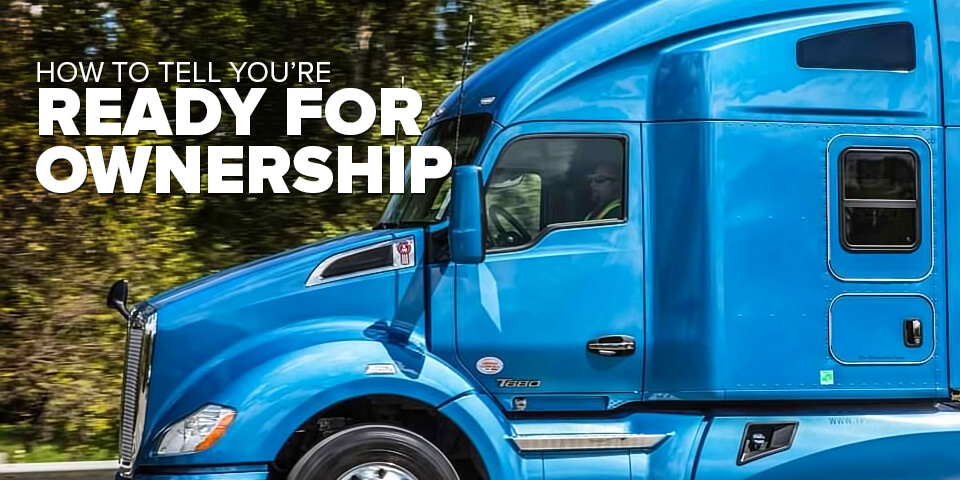In The News

How to Tell You’re Ready for Truck Ownership
The expedited trucking business can be lucrative for owner-operators. But it takes a lot of hard work, discipline, and knowledge of the business to succeed for the long haul as a truck owner.
How can you tell if you’re ready for truck ownership before you take the plunge?
Use the 3 “M’s” as your guide.
#1. Mission
Why do you want to purchase a truck for expediting?
Is it because you’ve driven for a fleet owner for a while, learned the business, gotten advice from successful owner-operators, and have crunched the numbers to determine that you could generate more income (profit) with your own vehicle?
Or, are you attracted to the “status” that comes with owning a truck without figuring out your path to profitability?
The reality is that expedited trucking isn’t for everybody. And there are a lot of nuances to learn about the business to be successful—such as putting yourself in a position to consistently get freight, deciding on which loads to accept, and managing your operating expenses for maximum profitability.
Ask any experienced owner-operator, and they will tell you: Learn the ABCs of the expedite business first; then think about purchasing a truck.
So, when in doubt, wait until you can confidently say: “I want to purchase a truck because, based on my numbers for how I typically run, I believe I can make—and keep—more money with my own truck.”
#2. Mindset
Do you have an owner mentality? In other words, are you comfortable with the risks that come with owning a truck?
For example, when you drive for a fleet owner, and the truck breaks down requiring $10,000 for repairs, you don’t have to shoulder that expense. The owner pays for it.
When freight is slow, and cash flow tightens, you’re not having to sweat keeping up with monthly truck payments.
You essentially get to earn money with someone else’s truck without the risks and liabilities of ownership.
So, if you have a low tolerance for risk and might feel overwhelmed with managing the ongoing operating, maintenance, and repair costs of the vehicle, then ownership might not be for you.
When you take on the owner mindset, you’re prepared to stomach some amount of uncertainty. You realize that with higher risk also comes higher potential reward.
But that doesn’t mean that you’re willing to be reckless. Instead, you acknowledge the risks and then do everything you can to manage the business in a way that reduces those risks.
How?
By thinking like a successful owner. Are you learning how to choose loads that are consistently profitable and minimize sitting time or deadhead miles? Do you know how to manage your costs in a way where you could still pay the bills and sustain your business even when freight is soft? Are you willing to be diligent with performing preventive maintenance on your truck to minimize the risk of unplanned downtime?
When you develop plans and best practices for the critical aspects of your business, you’re putting yourself in the best position to reduce risks while still maximizing your income potential as an owner.
#3. Money
Your success as an owner-operator largely hinges on cash-flow. And the lower your expenses, the more money you get to keep to cover those slow weeks and ultimately invest in your future.
So, as you consider whether you’re ready to buy a truck, examine your household expenses and assets. Are there areas where you can cut to help reduce your monthly outflow? Are there assets that you can sell to generate cash to have on hand for emergencies to keep your business afloat?
Other money questions to answer:
Have you put away sufficient cash for a down payment toward purchasing the truck?
The typical down payment will range from 10% to 20% depending on lender requirements, the vehicle, the purchaser’s industry experience, and other factors.
How is your credit history?
Your credit score not only impacts whether or not you get approved for financing to buy a truck but also several other factors tied to the cost of vehicle ownership, including the required down payment, interest rate (and, thus, monthly payment), and insurance costs. Do you have any collections, late payments, or other hits on your credit that you take care of to improve your credit score—and buying power?
How much cash have you saved for emergencies?
Most successful owner-operators and industry experts recommend having a minimum of one to three months of operating expenses in reserves. This way, you’ll have money available to help smooth out the wild feast-or-famine swings you’ll likely experience in the expedite business, especially during the first few months of truck ownership.
The Bottom Line
Being an expedite owner-operator has its privileges. But it’s not for everybody. So, think through the 3 “M’s” to ensure that truck ownership is right for you.
